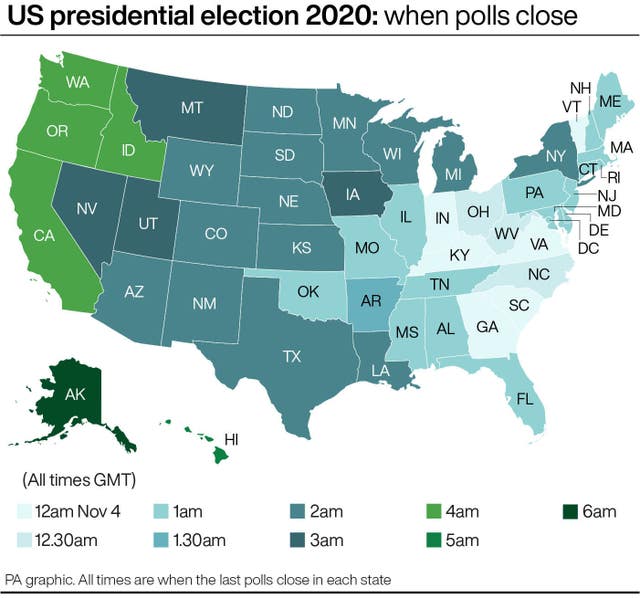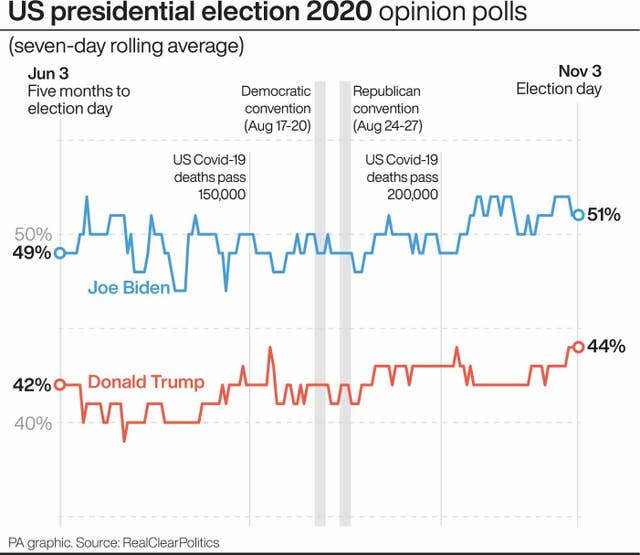Federal authorities are monitoring voting in the US and any threats to the election across the country from an operations centre outside Washington DC, run by the cyber-security unit of the Department of Homeland Security.
Officials there said there were no major problems detected early on Tuesday but urged the public to be wary and patient.
US Cybersecurity and Infrastructure Security Agency director Christopher Krebs said from the centre that there was “some early indication of system disruption”, but did not elaborate.
Don't forget to check out https://t.co/9tM84iOt71 for facts on elections and election security. We're constantly updating the content, so check back for more! Thanks to everyone that's amplifying!
— Chris Krebs #Protect2020 (@CISAKrebs) November 3, 2020
He added that he has “confidence that the vote is secure, the count is secure and the results will be secure”.
Mr Krebs said officials have seen attempts by foreign actors “to interfere in the 2020 election”, but officials “have addressed those threats quickly” and “comprehensively”.
He added that election day “in some sense is half-time” and there “may be other events or activities or efforts to interfere and undermine confidence in the election”.
He urged all Americans “to treat all sensational and unverified claims with scepticism and remember technology sometimes fails”.
It came as Donald Trump threatened legal action to block the counting of ballots received after election day. For example, if Pennsylvania ballot counting takes several days, as is allowed, the president claimed without evidence that “cheating can happen like you have never seen”.
In fact, there are roughly 20 states that allow mail-in ballots received after election day to be counted — up to nine days and longer in some states. Litigation has centred on just a few where states have made changes in large part due to the coronavirus.
A panel of federal appeals court judges has rejected an 11th-hour Republican effort to bar drive-through voting in Houston, Texas.
The 5th US Circuit Court of Appeals denied the request in a one-sentence ruling issued late on Monday.
The request stemmed from a lawsuit brought by conservative Texas activists, who have railed against expanded voting access in Harris County, where a record 1.4 million early votes have already been cast.
The county is the nation’s third-most populous and a crucial battleground in Texas, where Mr Trump and Republicans are bracing for the closest election in America’s largest red state in decades.

Harris County Democratic Party spokeswoman Angelica Luna-Kaufman said the appeals court decision was expected following a ruling earlier on Monday by a federal judge who rejected a Republican effort to invalidate nearly 127,000 votes in Houston because the ballots were cast at drive-through polling centres established during the pandemic.
“We are not surprised that this happened… we believe the law is on the side of the voters,” Ms Luna Kaufman said. “Hopefully it’s all over now.”
Mr Trump won Texas by nine points in 2016 but polls have shown Democrat Joe Biden still within reach in America’s biggest red state. Democrats also need to flip only nine seats to reclaim a majority in the Texas House for the first time in 20 years, and have targeted several races in Harris County.
Early voting numbers across the country have already eclipsed 2016 figures, and the lawsuits have started early.

Republicans and a local voter accused county officials in suburban Philadelphia of improperly sorting deficient ballots before Tuesday to give voters a chance to fix problems.
The suit comes after county Republicans noted a pile of ballots set aside during a walk-through of operations at the county courthouse in Norristown on Sunday.
There have already been roughly 300 lawsuits over the election filed in dozens of states, many involving changes to normal procedures because of the coronavirus pandemic, which has killed more than 230,000 people in the US. Legal battles ensued over signature matches, drop boxes and secrecy envelopes.
North Carolina also has seen a court fight between Democrats who support extending the deadline for absentee ballots and Republicans who oppose it. The six-day extension was approved by a state court.
In Minnesota, late-arriving ballots will be segregated from the rest of the vote because of ongoing legal proceedings, under a federal appeals court order.




Comments: Our rules
We want our comments to be a lively and valuable part of our community - a place where readers can debate and engage with the most important local issues. The ability to comment on our stories is a privilege, not a right, however, and that privilege may be withdrawn if it is abused or misused.
Please report any comments that break our rules.
Read the rules here